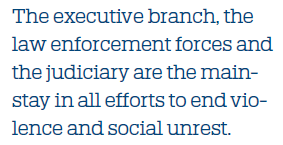Judiciary in SAR has a role to play in ending unrest
Updated: 2019-11-20 07:31
(HK Edition)
|
|||||||
Yang Sheng says HK courts need to do more in this battle against violence to live up to President Xi's expectations
President Xi Jinping said in Brazil last week that the central government "firmly supports" the Hong Kong Special Administrative Region government, led by Chief Executive Carrie Lam Cheng Yuet-ngor, in exercising law-based governance; "firmly supports" the Hong Kong Police Force (HKPF) in enforcing law with due diligence; and "firmly supports" the HKSAR judicial institutions in bringing perpetrators of violent crimes to justice according to law. The three "firmly supports" can be seen as Beijing's expectations for the HKSAR government to end the violence and social unrest in Hong Kong as soon as possible.
The executive branch, the law enforcement forces and the judiciary are the mainstay in all efforts to end violence and social unrest as well as governing Hong Kong according to law in general. It would be very difficult to end violence and social unrest in Hong Kong were any of the three not fully committed to the work at hand. So far, the executive branch and law enforcement departments have done the most to contain the spread and escalation of violence, with the HKPF bearing the full brunt of unjustifiable violence. In the past five months, the police have arrested thousands of rioters, but most of them were allowed by district magistrates to post bond and wait for trial. As a result, many of them went right back to doing illegal acts in the streets.

It should be noted that since violent attacks on police officers guarding government offices against masked and armed rioters began in the second week of June, certain foreign governments and politicians have been publicly encouraging all kinds of unlawful behavior by describing it as "free expression" and "fighting for democracy". And many people believe the rioters have been receiving financial and material support from overseas to sustain their illegal activities for so long. As a matter of fact, their material supplies, especially protective gear, have been upgraded almost constantly.
They have also been using brand-new metal tools to vandalize public and private property, such as subway stations, shopping centers, bank offices and pavements, and even the central government's liaison office building and Xinhua News Agency's local branch. Funding for such elaborate criminal operations must have been astronomical, and few, if any, believe the opposition camp in Hong Kong is financially equipped to foot the bills that have been stacking up; hence the growing calls for the HKPF to find out who has been bankrolling the "black revolution".
In contrast to all-out efforts by the executive branch of the SAR government and the HKPF to contain violence by any means necessary, the local courts have not all lived up to their reputation, nor public expectations for that matter. Public dissatisfaction seen on social media toward many court decisions regarding rioters caught red-handed in the streets has been rising, while numerous people are wondering on what law those magistrates based their weird rulings. And that is not all people are complaining about as far as local courts are concerned. Many were shocked when the High Court ruled on Monday that the emergency legislation that brought the mask ban into effect last month was "incompatible with the Basic Law" and therefore invalid.
Since the decision concerns the Basic Law, the National People's Congress Standing Committee's Legislative Affairs Commission, which was fully involved in the legislative process of the Basic Law, was also rightly alarmed, to the point it issued a statement on Tuesday in response to the High Court ruling. A spokesperson for the LAC said in an official statement: "The Constitution and the Basic Law together form the constitutional basis of the special administrative region," and "whether a law of the HKSAR is in conformity with the Basic Law of the HKSAR can only be judged and decided by the NPC Standing Committee, and no other organ has the right to judge or decide."
In accordance with Article 8 of the Basic Law of the HKSAR, the laws previously in force in Hong Kong, including the Emergency Regulations Ordinance, which provides the legal basis for the mask-ban emergency legislation, shall be maintained except for those that contravene the Basic Law or that have been amended by the legislative body of the HKSAR, the spokesperson noted. As per the decision on handling the laws previously in force in Hong Kong in accordance with Article 160 of the Basic Law, which was made by the NPC Standing Committee on Feb 23, 1997, the Emergency Regulations Ordinance was adopted as the law of the HKSAR, the spokesperson said. Many members of the public, including this author, felt relieved upon hearing of the statement.
The author is a current affairs commentator.
(HK Edition 11/20/2019 page9)